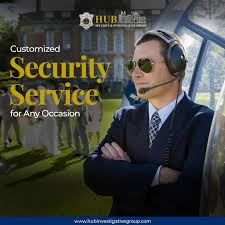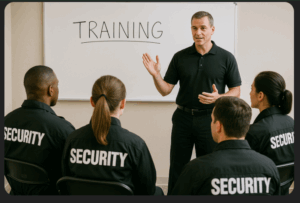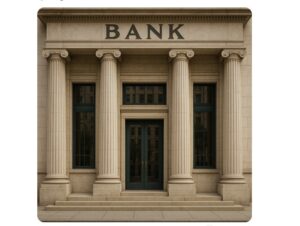What Determines the Cost of Protection? Why Security Guard Pricing Varies.
When businesses or individuals seek to hire private security, one of the first questions they ask is: “How much does it cost to hire a security guard?” The answer isn’t always straightforward. Security guard pricing depends on several key factors including guard experience, service type, region, risk level, and contract duration. Understanding these pricing elements helps organizations make informed, budget-friendly decisions without compromising on safety.
Understanding what determines the cost of protection is crucial for effective budgeting in security services..
This blog breaks down what goes into the cost of hiring a security guard and how to determine the right price point for your specific needs.
This blog will further explore what determines the cost of protection and how these elements can affect your security strategyThis blog aims to clarify what determines the cost of protection and guide you in making informed decisions..
1. Hourly Rates: What You Can Expect, What Determines the Cost of Protection?
Knowing what determines the cost of protection can help you choose the right type of service for your needs.
Security guard pricing is typically calculated on an hourly basis. National averages in the United States range from $20 to $50 per hour, depending on several influencing elements.
-
Unarmed Security Guards: $30–$60 per hour
-
Armed Security Guards: $55–$100+ per hour
-
Off-duty Police Officers: $60–$100+ per hour
Keep in mind, these are general estimates. Pricing can go higher for specialized environments such as executive protection or hazardous job sites.
2. Type of Security Service Impacts Cost
The type of security guard service you need has a direct impact on price. Here are the common categories and how they influence cost:
-
Unarmed Guards: Best for retail stores, schools, and office buildings. Lower cost due to reduced liability and less training.
Understanding what determines the cost of protection can greatly influence your choice of security services.
-
Armed Guards: Typically hired for banks, dispensaries, or high-crime areas. Costs are higher due to firearm certifications and increased insurance.
-
Mobile Patrol Units: Used for large properties, campuses, or gated communities. Rates may be hourly or a flat fee depending on the route and frequency.
-
Event Security: Temporary staffing for concerts, festivals, or private events. Priced based on crowd size, risk level, and number of personnel needed.
-
24/7 On-Site Security: Long-term contracts offer discounted rates but require larger budgets upfront. This is common for construction sites, warehouses, or residential communities.
3. Experience, Training, and Certification
As you consider your options, think about what determines the cost of protection in relation to your safety requirements.
Security guards with extensive experience, military backgrounds, or law enforcement credentials come at a premium. They offer more than just a deterrent—they know how to respond effectively during emergencies.
Additional certifications can also raise pricing, including:
-
CPR and First Aid
-
Firearm Licensure
-
Tactical Defense Training
-
Customer Service & De-escalation
If you’re looking for professional-grade protection, investing in a guard with these qualifications is often worth the cost.
4. Geographic Location and Market Demand
Understanding what determines the cost of protection can significantly impact your selection of service providers.
Security guard pricing varies widely by region. Metropolitan areas like New York, Los Angeles, or Miami often see significantly higher rates than rural or suburban areas.
Consideration of what determines the cost of protection is essential when evaluating different security providers.
Cost drivers by location include:
-
Local minimum wage laws
-
Crime statistics
-
Living costs
-
Insurance premiums
In areas with high demand for security services (such as city centers or industrial districts), prices tend to rise. Always consider the local market when evaluating your budget.
5. Duration and Contract Type
The type and duration of the service you choose are crucial factors in what determines the cost of protection.
Whether you need short-term or long-term security affects the overall pricing. Companies often provide bulk discounts for extended contracts or continuous coverage.
-
Short-term (hours or days): Higher per-hour cost due to setup and admin fees.
-
Long-term (months to years): Lower-medium hourly rates through negotiated contracts.
Always ask about volume discounts, especially if you’re planning multiple shifts or a permanent post.
6. Risk Level and Environment
Higher-risk environments can directly affect what determines the cost of protection you need.
Higher-risk environments demand more experienced guards and sometimes additional equipment or hazard pay. For example:
-
Prioritizing what determines the cost of protection in high-risk environments can lead to better safety outcomes.
-
Political or protest-prone areas
-
Cash-handling sites (banks, dispensaries)
-
Remote or poorly lit locations
Guards placed in these situations must remain highly alert and often require extra insurance coverage, which raises the overall cost.
7. Additional Equipment and Vehicle Costs
Being aware of what determines the cost of protection helps in selecting the appropriate equipment and services.
The additional equipment required can vary based on what determines the cost of protection in your situation.
Security guard pricing may also include the use of tools, uniforms, vehicles, or communication devices.
Some common add-on fees include:
-
Marked patrol cars
-
Body cameras
-
Two-way radios
-
Flashlights, batons, vests
-
Custom uniforms or branding
If the security company provides advanced surveillance or drone monitoring, expect an additional premium for that technology.
8. In-House vs. Contracted Security Services
In-house versus contracted services can play a role in understanding what determines the cost of protection
Understanding what determines the cost of protection is vital in the decision-making process for security options.
.
Organizations may choose between hiring in-house security staff or outsourcing to a professional security company.
In-house security:
-
Full-time employees
-
Includes payroll, benefits, uniforms, training
-
Higher upfront HR cost but more internal control
Contracted security:
-
Hired through licensed agencies
-
Often more flexible and cost-effective
-
Agency handles training, licensing, and insurance
In most cases, businesses prefer contracted services to avoid the complexity of HR compliance and liability.
9. Licensing and Insurance Considerations
Make sure to ask about what determines the cost of protection when consulting potential security firms
What determines the cost of protection varies based on the type of security services you choose.
.
Reputable security firms are licensed and insured, and those fees are built into the pricing. Insurance includes liability coverage for injury, property damage, and wrongful action.
Cheaper providers may cut corners here, which could expose your business to legal risks. Always verify:
-
State licensing status
-
Proof of liability insurance
-
Background check procedures
Investing in a licensed provider ensures compliance and protects you from unexpected costs down the line.
Questions about what determines the cost of protection should be at the forefront of your discussions with potential providers.
10. Questions to Ask Before Hiring a Security Guard Company
When evaluating options, consider what determines the cost of protection as a key decision factor.
To get the best value for your money, ask the following questions during your consultation:
-
What’s your hourly rate for armed/unarmed services?
-
Are your guards licensed and insured?
-
How do you handle emergencies or incidents?
-
Can you provide references or reviews?
-
Do you offer discounts for long-term contracts?
These questions help determine if the pricing matches the level of service and professionalism your site needs.
Final Thoughts: Understanding What Determines the Cost of Protection
Ultimately, understanding what determines the cost of protection is essential for making safe investments.
While it’s tempting to go with the lowest bidder, cutting corners on security rarely pays off. Consider your unique needs—whether it’s crowd control, theft deterrence, or 24/7 surveillance—and invest in quality personnel who are trained, certified, and reliable.
Security guard pricing is a critical part of your business’s safety strategy. With the right budget and provider, you can secure your property, people, and peace of mind.
Review your requirements with respect to what determines the cost of protection as you finalize your security planning.
Need a Customized Security Quote?
Need a Customized Security Quote? Understanding what determines the cost of protection can help you get the best service.
LINKS:
https://hubsecurityandinvestigativegroup.com/
https://hubsecurityandinvestigativegroup.com/quick-quote/
https://www.instagram.com/hubsecurityandinvestigative/


